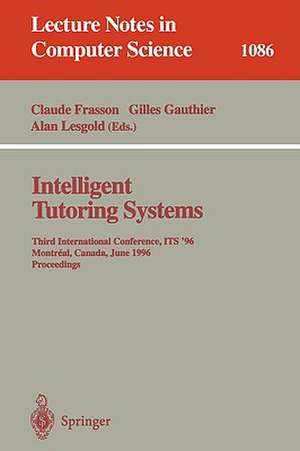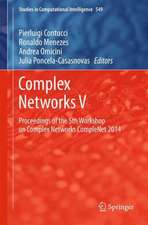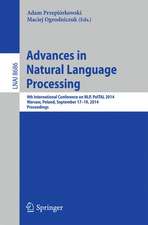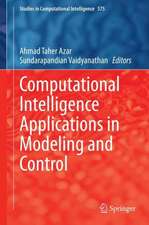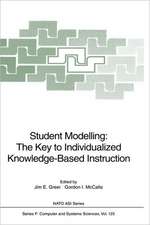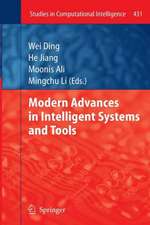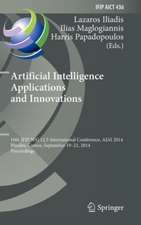Intelligent Tutoring Systems: Second International Conference, ITS '92, Montreal, Canada, June 10-12, 1992. Proceedings: Lecture Notes in Computer Science, cartea 608
Editat de Claude Frasson, Gilles Gauthier, Gordon I. McCallaen Limba Engleză Paperback – 27 mai 1992
Din seria Lecture Notes in Computer Science
- 20%
 Preț: 1061.55 lei
Preț: 1061.55 lei - 20%
 Preț: 307.71 lei
Preț: 307.71 lei - 20%
 Preț: 438.69 lei
Preț: 438.69 lei - 20%
 Preț: 579.30 lei
Preț: 579.30 lei -
 Preț: 410.88 lei
Preț: 410.88 lei - 17%
 Preț: 427.22 lei
Preț: 427.22 lei - 20%
 Preț: 596.46 lei
Preț: 596.46 lei - 15%
 Preț: 448.04 lei
Preț: 448.04 lei - 20%
 Preț: 353.50 lei
Preț: 353.50 lei -
 Preț: 389.49 lei
Preț: 389.49 lei - 20%
 Preț: 309.90 lei
Preț: 309.90 lei - 20%
 Preț: 645.28 lei
Preț: 645.28 lei - 20%
 Preț: 763.23 lei
Preț: 763.23 lei - 15%
 Preț: 580.46 lei
Preț: 580.46 lei - 20%
 Preț: 310.28 lei
Preț: 310.28 lei - 20%
 Preț: 655.02 lei
Preț: 655.02 lei - 20%
 Preț: 1183.14 lei
Preț: 1183.14 lei - 20%
 Preț: 340.32 lei
Preț: 340.32 lei -
 Preț: 449.57 lei
Preț: 449.57 lei - 20%
 Preț: 591.51 lei
Preț: 591.51 lei - 18%
 Preț: 938.83 lei
Preț: 938.83 lei - 20%
 Preț: 337.00 lei
Preț: 337.00 lei - 20%
 Preț: 649.50 lei
Preț: 649.50 lei - 20%
 Preț: 607.40 lei
Preț: 607.40 lei - 20%
 Preț: 1414.79 lei
Preț: 1414.79 lei - 20%
 Preț: 1024.44 lei
Preț: 1024.44 lei - 20%
 Preț: 583.40 lei
Preț: 583.40 lei - 20%
 Preț: 453.32 lei
Preț: 453.32 lei - 20%
 Preț: 575.49 lei
Preț: 575.49 lei - 20%
 Preț: 1075.26 lei
Preț: 1075.26 lei - 20%
 Preț: 585.88 lei
Preț: 585.88 lei - 20%
 Preț: 825.93 lei
Preț: 825.93 lei - 17%
 Preț: 360.20 lei
Preț: 360.20 lei - 20%
 Preț: 763.23 lei
Preț: 763.23 lei - 20%
 Preț: 340.32 lei
Preț: 340.32 lei - 20%
 Preț: 504.58 lei
Preț: 504.58 lei - 20%
 Preț: 369.13 lei
Preț: 369.13 lei - 20%
 Preț: 580.93 lei
Preț: 580.93 lei - 20%
 Preț: 343.62 lei
Preț: 343.62 lei - 20%
 Preț: 350.21 lei
Preț: 350.21 lei - 20%
 Preț: 583.40 lei
Preț: 583.40 lei - 20%
 Preț: 583.40 lei
Preț: 583.40 lei - 15%
 Preț: 438.59 lei
Preț: 438.59 lei - 20%
 Preț: 341.95 lei
Preț: 341.95 lei - 20%
 Preț: 238.01 lei
Preț: 238.01 lei - 20%
 Preț: 538.30 lei
Preț: 538.30 lei
Preț: 665.75 lei
Preț vechi: 832.19 lei
-20% Nou
Puncte Express: 999
Preț estimativ în valută:
127.39€ • 133.02$ • 105.19£
127.39€ • 133.02$ • 105.19£
Carte tipărită la comandă
Livrare economică 15-29 aprilie
Preluare comenzi: 021 569.72.76
Specificații
ISBN-13: 9783540556060
ISBN-10: 3540556060
Pagini: 708
Ilustrații: XIV, 694 p.
Dimensiuni: 155 x 235 x 37 mm
Greutate: 0.98 kg
Ediția:1992
Editura: Springer Berlin, Heidelberg
Colecția Springer
Seria Lecture Notes in Computer Science
Locul publicării:Berlin, Heidelberg, Germany
ISBN-10: 3540556060
Pagini: 708
Ilustrații: XIV, 694 p.
Dimensiuni: 155 x 235 x 37 mm
Greutate: 0.98 kg
Ediția:1992
Editura: Springer Berlin, Heidelberg
Colecția Springer
Seria Lecture Notes in Computer Science
Locul publicării:Berlin, Heidelberg, Germany
Public țintă
ResearchCuprins
Intelligent tutoring and high school mathematics.- Generality watching: ITS caught between science and engineering.- Guidon-manage revisited: A socio-technical systems approach.- Programming environments for novices.- Granularity and context in learning.- Going from intelligent tutors to tools for learning.- Assisted mathematics: the case of discrete probabilities.- Learning recursion through the use of a mental model-based programming environment.- STUDIA: un système tutoriel intelligent coopératif fondé sur la négociation et sur un modèle dynamique de dialogue.- An iconic intention-driven its environment.- Providing problem explanation for ITS.- The Fawlty article tutor.- Towards an epistemology for Guided Discovery Tutoring: The Popperian connection.- Making processes visible: Scaffolding learning with reasoning-congruent representations.- Winch simulation: Multiple, linked representations of linear functions.- A learning environment based on multiple qualitative models.- EXPITS: an experimental environment on ITS.- Intelligent tutoring system for symbolic calculation.- Curriculum tree: A knowledge-based architecture for intelligent tutoring systems.- L'Assistance à l'usager dans DIGITEF: un mécanisme réutilisable.- Résolution par analogie de problèmes géométriques dans une perspective tutorielle.- A pedagogical design and architecture for intelligent tutoring and aiding in supervisory control of complex systems.- Une architecture multiagent.- From elementary knowledge schemes towards heuristic expertise — Designing an its in the field of parallel programming.- Answering student queries: Functionality and mechanisms.- Instruction as reasoning about multiple objectives.- Représentation des connaissances dans un générateur de systèmes d'E.I.A.O.-Knowledge representation for an intelligent tutoring system based on a multilevel causal model.- Knowledge base compilation and the language design game.- Instructional expertise.- Cognitio: An extended computational theory of cognition.- Apport du style linguistique à la modélisation cognitive d'un elève.- A cognitive framework for Second Language error diagnosis.- Evaluation of Feature Based Modelling in subtraction.- Une modélisation de l'architecture cognitive d'un étudiant pour un système tutoriel intelligent.- Bootstrapping mental constructions: a learning system about negative numbers.- Towards the theory-guided design of help systems for programming and modelling tasks.- A new architecture for Intelligent Help Systems.- The UNIX Tutor.- Tuteurs Intelligents et Intelligence Artificielle: problèmes posés en construction de figures géométriques.- Génération d'exercices en algèbre, premières approches dans le cadre du projet APLUSIX.- ADAPT: Automated debugging in an adaptive Prolog tutor.- Reference network: A genetic model for Intelligent Tutoring Systems.- Form, frequency, markedness and strategies in second language performance modelling.- Why should an ITS bother with students' explanations?.- Student strategies for learning programming from a computational environment.- An intelligent language tutoring system for handling errors caused by transfer.- The application of cognitive diagnosis to the quantitative analysis of simple electrical circuits.- Student modeling and mastery learning in a computer-based programming tutor.- Application de la méthodologie du traçage de modèle à un environnement d'apprentissage utilisant une stratégie pédagogique non directive.- Prédiction du niveau d'acquisition des connaissances dans la modélisation del'étudiant.- Instructional planning using focus of attention.- To contradict is human.- Mise en oeuvre d'un modèle de l'apprenant générique dans le système EDDI.- Student model diagnosis for adaptive instruction in ITS.- A systemic approach for student modelling in a multi-agent aided learning environment.- Diagnostic cognitif de l'apprenant par apprentissage symbolique.- Probabilistic student models: Bayesian Belief Networks and Knowledge Space Theory.- A framework for intelligent knowledge sequencing and task sequencing.- The use of pedagogic misrepresentation in tutorial dialogue.- Planification pédagogique: de l'expertise humaine à sa modélisation dans un STI.- COCA: A shell for intelligent tutoring systems.- Enhancing the instructional capabilities of Intelligent tutoring systems.- Measuring learning strategies and understanding: A research framework.- From testing to training: Evaluating automated diagnosis in statistics and algebra.- Detecting and reacting to the learner's motivational state.- Automated generation of examples for a tutorial in case-based argumentation.- The advantages of data flow diagrams for beginning programming.- Tools for teacher participation in ITS design.- Explanation in expert system shells: a tool for exploration and learning.- Intelligent tutoring with dumb software.- Using expert tutor knowledge to design a Self-Improving intelligent tutoring system.- Modelling expertise for educational purposes.- Distributed learning companion system: WEST revisited.- People power: A human-computer collaborative learning system.- User modeling and architecture in industrial ITSs.- CHEMPROF: “The chemical literacy problem”.- The Grace Tutor: A qualified success.
